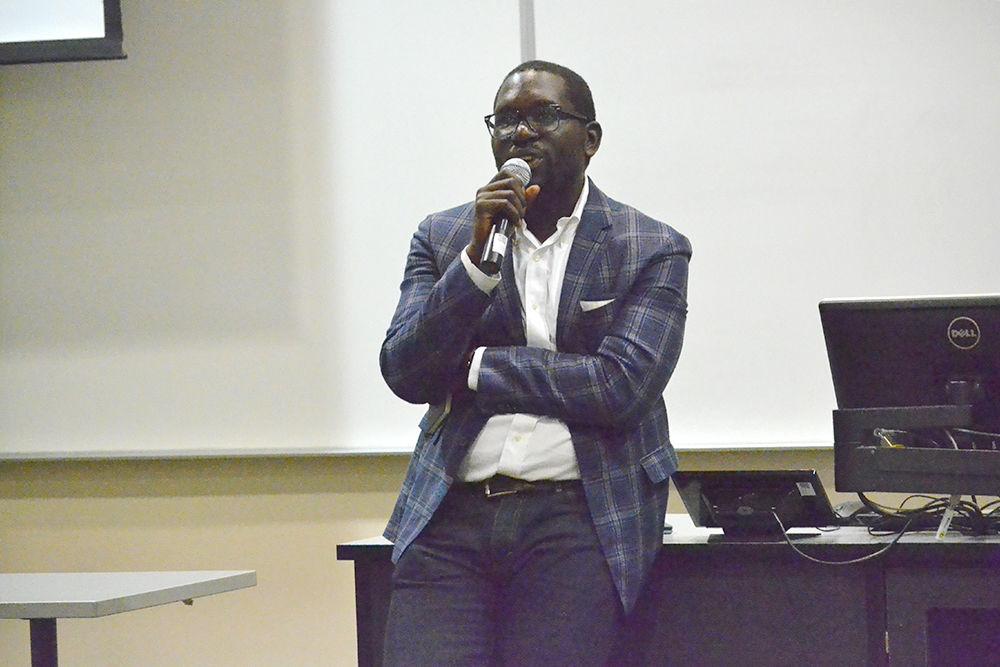
Sindy Huang
Jamelle Bouie, the chief political correspondent for Slate magazine and political analyst for CBS speaks about the Civil Rights in the Age of Trump in Withers Hall on Monday. Bouie said that the demagogue ideals of Trump are just a historical recurrence similar to those after the Redeemers after the Civil War and the platform of George Wallace in 1968.
Monday night, students gathered in Withers Hall to hear Jamelle Bouie, a CBS political analyst and writer for Slate magazine, speak on his thoughts on race and civil rights in the modern era. Despite the rain, almost 50 students turned out to the talk, filling the lecture hall.
The lecture was part of the American Values Lecture Series, which puts American current events into context. Bouie’s lecture focused on what President Donald Trump’s election means for America.
“One way to think about Donald Trump and this election was that it was an election about forgotten Americans,” Bouie said. “About the working class, about the unnoticed by Washington working class. That narrative is persuasive in certain ways, if you looked at the kind of people who voted for Donald Trump.”
Bouie said that most people who voted for Trump were not poor; they were small business owners, police officers, firemen and others. He said many of them make reasonable salaries, yet felt insecure about their positions, which was something Trump leveraged to get their votes.
“It’s clear to me that a lot of this was racial resentment,” Bouie said. “Trump’s narrative about America says that ‘People like you are on the bottom. You are under attack. You used to command respect, and you can’t anymore. You used to be able to elect a president who looks like you. I will change this. I will make America great again.’”
Bouie believes that race came to play a larger role in dividing American politics after the election of former President Barack Obama.
“You had people really anxious, newly aware of their racial status, worried about the future of the country,” Bouie said. “You have, during the period of the Obama administration, a seeming increase in militance among African-Americans, including police shootings. You essentially had situations where these racial issues were brought up.”
According to Bouie, this was not the first time this type of backlash against rising minority groups occurred. He mentioned Reconstruction, the 1920s and the Civil Rights Movement as other notable periods of activism over issues of race.
“[Freed slaves] worked very hard to re-establish some semblance of order in these [southern] states,” Bouie said. “They had some backlash, and it was a pretty extreme sort of violence. The Klu Klux Klan was one of many other vigilantes.”
Despite the resurgence of racially motivated violence in recent years, Bouie said he felt there was hope for the future, but that hope was dependent on how the next years go politically.
“I think there’s grounds for optimism, but we should always remember never to be pollyannish about this,” Bouie said. “Things are pretty bad. The situation, I’d say, is pretty bad, but progress can happen. It’s up to those of us who are interested in pushing back against reaction which this notion of whiteness to do something about it.”
After the lecture, there was a period for questions, during which many students shared their thoughts and opinions about what Bouie shared.
Mannirmal Jawa, a junior studying political science, said she enjoyed Bouie’s lecture.
“I thought he was great,” Jawa said. “I was really surprised when I got the email that he was coming to speak because I have seen a lot of his work before. I was really surprised that someone of his caliber was coming to speak.”
Jawa felt that the topic he discussed was relevant and necessary in today’s political climate.
“I think it was a really important lecture, and I learned a lot from what he had to say,” Jawa said.
While Dmitry Zaritskiy, a graduate student studying animal science, also found Bouie’s lecture to be interesting, he had concerns about the questions raised after the lecture.
“I liked the historical context his speech gave,” Zaritskiy said. “I’m a foreigner, and coming to something like this helps me understand why Trump was elected. However, I am an animal science major, and I didn’t like the questions. They made it difficult to understand for someone who is not in political science. I thought they should be more direct and they should be directed toward a larger audience.”